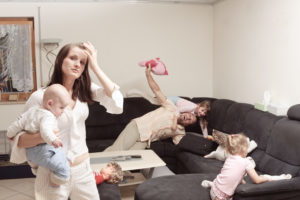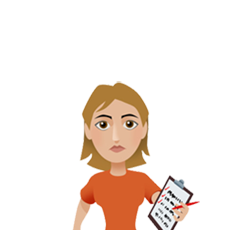Get Organized: 10 Tips to Manage an ADHD Household

It's tough when one or more kids in a household has ADHD. Toys are strewn about the house and dirty dishes are left on any available flat surface (often a mile away from the kitchen). Closet floors are piled high with dirty laundry. School papers are lost on a daily basis.
Article continues below...
Want to Motivate Kids?
Download a free tipsheet "The Parent's Guide to Motivating Your Complex Kid" to help your child find the motivation to do... anything and everything!
What Is A Mother To Do?
First, recognize that your child is not behaving this way out of spite. She has a neurobiological condition that makes it difficult to manage “stuff.” ADHD is not just a deficit in attention -- in fact, kids with ADHD can super-hyper-focus on things that interest them. But underlying all ADHD is a challenge of executive functioning (EF).
To simplify Executive Function (EF), think about a train on a track. The conductor keeps the train steady on its path, and the track takes the train to its destination. Without either the conductor or the tracks, the train is either stuck in place, or likely to cause a lot of trouble.
Your child's executive function challenges typically means he doesn't know how to get from A to B and from B to C. For example, you may see clearly that dirty laundry needs to be thrown into a hamper inside your daughter's closet. But your child might have no concept or memory that the hamper exists, much less that it's in the closet. It's much easier to impulsively (again, not usually on purpose) just drop her clothes off her body wherever she might be standing.
Distractibility and inattention certainly come into play when it comes to managing daily chores. But one of the biggest problems kids face when having to keep up with home and school responsibilities is the dreaded feeling of boredom. ADHD brains search out stimulation, and there's nothing exciting about setting the table for dinner, walking the dog around the same ‘ole block, or facing an hour or more of homework each night.
We must keep in mind, though, that even though ADHD is a medical condition, that shouldn't let your kids off the hook in managing their responsibilities. If you understand how the ADD brain works, there are ways to help your child manage these things.
10 Tips to Help your Child Get Organized
If you, the mom, are totally disorganized, or you have ADHD yourself, that can make things tougher all around for your child. But it doesn't mean your life has to be in a constant state of chaos.
-
- Get your child's ADHD optimally treated (yours, too, if you have ADHD). Putting available tools in place makes life much easier to manage. Because telling your child to just try harder or “just do your homework” is like asking someone who is hard of hearing to just listen harder. Whether medication or behavioral management (like therapy or coaching) is recommended, it's not enough to acknowledge ADHD – it must be actively treated.
- Change your expectations. If there is ADHD at home, your house will most likely not look like your sister Carol's or your neighbor Sam's. Kick it down a notch and accept less than perfection. Everyone will be much happier.
- Use visual cues. Draw up diagrams of how your child's room, closet, even backpack should look, and tape them up on the wall for constant reference.
- Show your child how to use timers. Set the timer when there's a chore to do.
- Always ALWAYS remind your child ahead of time when he needs to leave the house, work on chores, homework, etc. Children (and adults) with ADHD notoriously have difficulty with transitions, especially when it's from a pleasant activity. Give ten-minute reminders, starting at least ½ hour before start time.
- Chunk chores. Break down steps so your child doesn't feel overwhelmed. For example, instead of telling her to clean her room, first ask her to pick up her clothes off the floor. (Again, using a visual chart with all the steps can make these kinds of chores easier to do.)
- Have your child work with you on household chores so he can learn skills. For example, have him join you in making the bed, but give him things that aren't overwhelming. While you're putting on the sheets, he can be putting the pillowcases onto the pillows.
- Make it fun! While putting clean clothes away, finish with a sock fight. Or play basketball by “shooting” dirty clothes into that hamper in the closet!
- Use checklists. Don't expect your child to simply know what is expected of her. Spell it out and write it down.
- Reward your child for getting things done. Put together a grab bag for success or give an older child points towards a coveted prize. Typically, the sooner the reward is given, the better this works.
Many moms (typically with ADHD) come to me worried that their own problems with disorganization will mean their child will never learn needed skills. Instead of pretending you have it all together, show him that you, too, struggle, and that reaching out for help can make projects more manageable. You can also work together with your kids to solve problems. For example, you can model behaviors that are helpful by saying things like, “wow, this bookcase is really a mess. What do you think we can do to make it look less cluttered?”
Lastly, if your budget allows, consider bringing in a professional to help both you and your family with problem areas. You'd be amazed at how professional organizers and ADHD coaches can set up systems that work for your ADHD family.
What's Your Parent Style?
Are you cool under pressure, or ready to come apart at the seams? Discover your parenting style!


